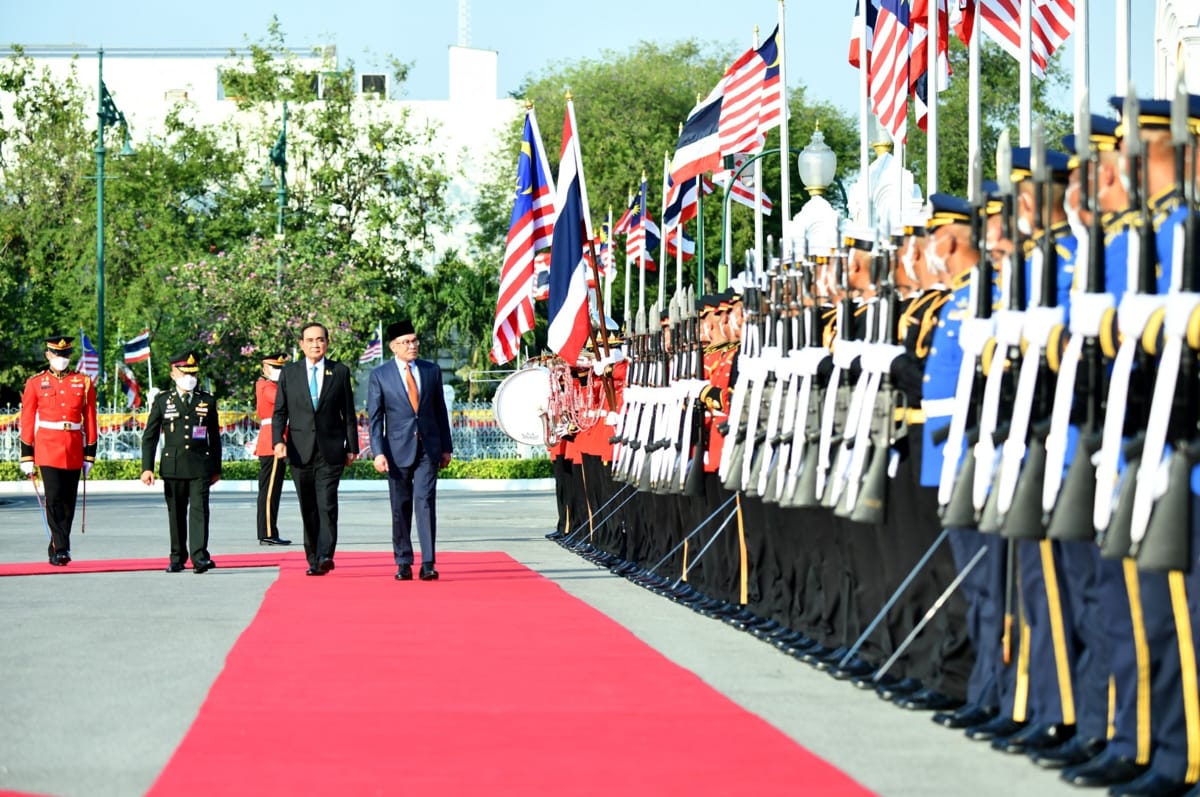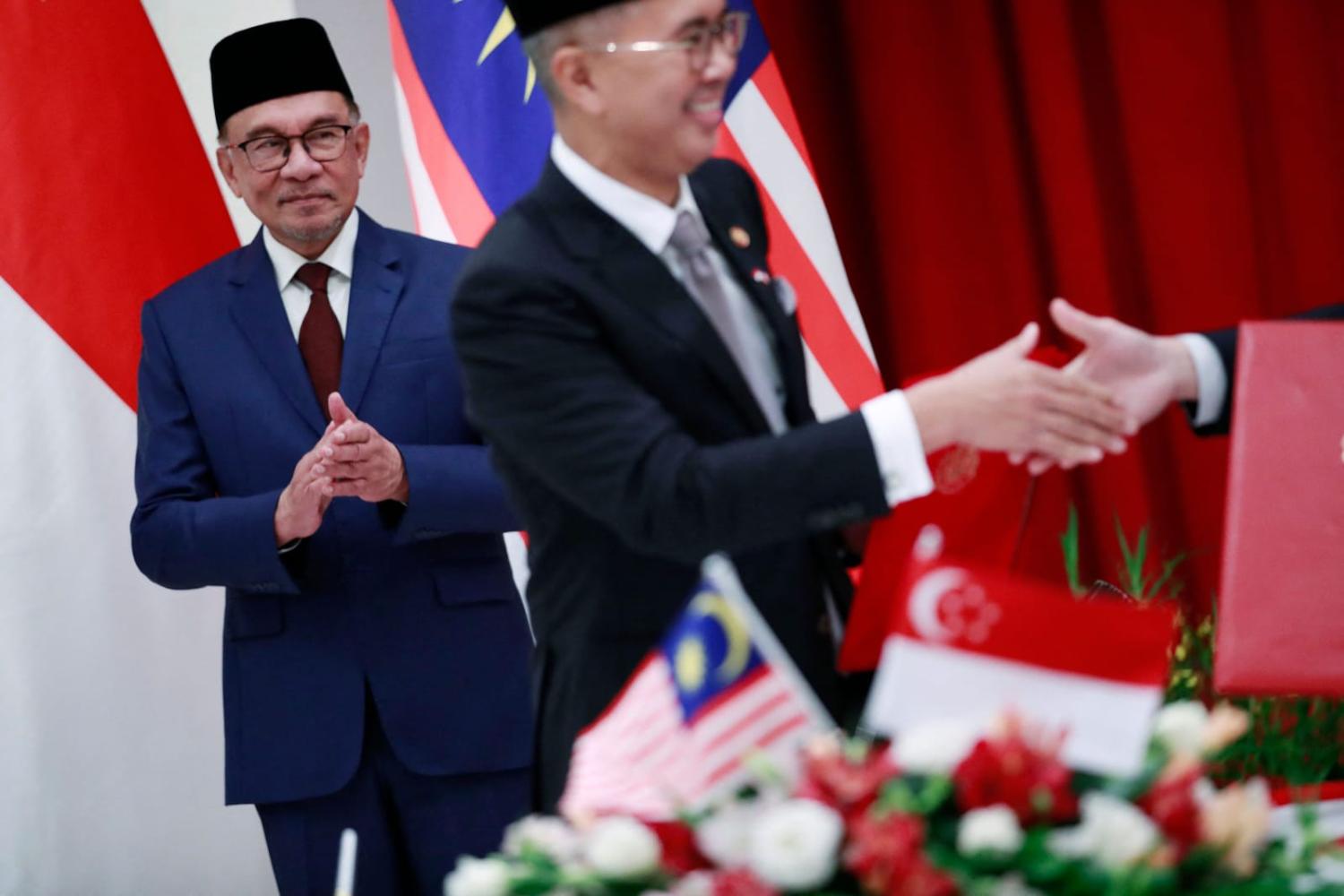Nearing the hundred-day mark of his tenure, Malaysian Prime Minister Anwar Ibrahim is emerging as one of Southeast Asia’s leading statesmen – one whose voice could help move the needle on critical regional issues such as Myanmar and economic cooperation. Since taking office in November 2022, he has already travelled to Indonesia, Brunei, Singapore, Thailand and Turkey and hosted senior officials from countries including the United States, Germany and Singapore. This is a pace of travel and engagement unmatched by his recent predecessors.
While Anwar’s rate of travel is tied to the loosening of Covid-19 travel restrictions and a general re-opening of the region, this whirlwind tour of diplomatic engagement reflects his desire to maximise the window of time during which he’s relatively politically secure. If Anwar can hold open the window by maintaining approval from the public – and, more importantly, from his coalition partners – he would fill the critical leadership void in Malaysia left by years of domestic turmoil marked by four prime ministers in as many years, possibly allowing Kuala Lumpur to stop punching below its weight and even surpass expectations.
Anwar’s political position is precarious, given that his coalition is replete with former rivals and relies on the highly unstable United Malays National Organisation (UMNO), which is rife with infighting. With state assembly elections expected to be held this summer, any swing in Anwar’s or his coalition members’ popularity over the next several months could hamper his ability to govern.
It may be due to this precariousness that Anwar, dual-hatted as finance minister, has focused his travel abroad primarily on economic deals that could carry benefits for his constituents at home. Malaysia experienced unexpectedly strong economic growth in 2022, but this boost is the result of reopening post-Covid; the economy is expected to cool in 2023 due to a slowdown in pent-up domestic demand and global growth. The budget Anwar rolled out last week was the biggest ever for Malaysia and included targeted subsidies, development expenditures for infrastructure, and incentives to attract foreign investment, reflecting his diplomatic and domestic political agenda to seal economic deals in the hopes of political protection.
Accordingly, Anwar and Indonesian President Joko “Jokowi” Widodo agreed last month to work together to “fight discrimination” against their domestic palm oil industries – a key commodity export – in response to the European Union’s decision to ban the sale of commodities linked to deforestation. Similarly, Anwar’s visit to Singapore was centred on economic cooperation, including on the digital and green economies. And in Thailand, Anwar and Thai Prime Minister Prayut Chan-o-cha pledged to expand bilateral trade to US$30 billion by 2030, signing agreements on key economic issues for Malaysia, including renewable energy technology, cross-border power grids and cooperation in the digital economy.
Anwar was also more forward-leaning in demonstrating his potential regional leadership. Notably, he urged Prayut – who has close ties to senior members of Myanmar’s military government – to take a direct stance against the military government, suggesting that ASEAN “carve Myanmar out” for now. In an interview with Thai media, Anwar took aim at ASEAN’s Five Point Consensus (5PC), saying “the ASEAN way needs to be revised when it comes to Myanmar” and that “constructive engagement [with the junta] has not been working,” adding that he and Jokowi – who is the ASEAN chair in 2023 – will discuss “formulating some new strategy” when they meet in the coming weeks. With Malaysia hosting an estimated 158,000 refugees from Myanmar, Anwar is under domestic pressure to address the situation.

Anwar also used the trip to refloat a proposal for an Asia Monetary Fund (AMF), which was first proposed by Japan during the 1997 Asian Financial Crisis. During a speech at the Malaysia-Thai Chamber of Commerce, Anwar argued that an AMF would strengthen the region’s defences against economic crises without having its infrastructure “decided by outsiders”. Anwar’s push for an AMF stands in stark contrast to a previous tussle between him and his then-mentor Mahathir in the heyday of the 1997–98 Asian Financial Crisis, when Anwar favoured an IMF bailout while Mahathir preferred capital controls – a debate that played a role in Anwar’s ouster and jail time.
Anwar has also underscored his desire to project camaraderie with Malaysia’s fellow Muslim-majority countries. His last-minute trip to Türkiye in the aftermath of the deadly earthquake earlier this month was at the request of President Recep Tayyip Erdoğan, a close ally of Anwar’s. During the trip, Anwar was careful to avoid being seen as overly deferential to Washington, noting that his government’s decision to send aid to Syria following the 6 February earthquake was a “question of humanitarian aid for [Syria],” adding that he “did not care about US policy”.
Such rhetoric reflects the efforts he must make to placate his own nationalist coalition partners and avoid giving the opposition coalition – especially the Malaysian Islamic Party (PAS) – any ammunition against him. PAS, which supports strict sharia law, surprised many observers by winning the most seats in parliament of any single party in the election last year, tripling its total from the 2018 election.
While Anwar’s rhetoric seems like a response to those electoral winds, his past is demonstrative of his positive views of the United States and the West compared to his predecessors. Indeed, while Mahathir explicitly blamed US provocations for cross-Strait tensions in August 2022 and called on Southeast Asia to move closer to China, Anwar appears ready to strike a more balanced tone – at least in Western media.
China, however, is almost certainly eyeing opportunities to court Anwar, and a visit to Beijing may already be in the works – possibly for the third Belt and Road Forum in the coming months. Washington and its allies would be wise to engage Anwar early at the highest levels. US Trade Representative and Cabinet official Katherine Tai’s meeting with Anwar on 16 February was a good first step, with the two focusing discussions on the importance of the US–Malaysia trade and investment relationship.
Facilitating similar opportunities for engagement will reassure Anwar and neighbouring leaders that Washington will continue to be a credible and reliable partner in the region – and may help them avoid knee-jerk responses that attribute any future US–China tensions to what the People’s Republic of China espouses. As long as Anwar can deftly navigate his tricky domestic political situation, he may very well be able to lead Malaysia and the region when Kuala Lumpur is scheduled to chair ASEAN in 2025.

